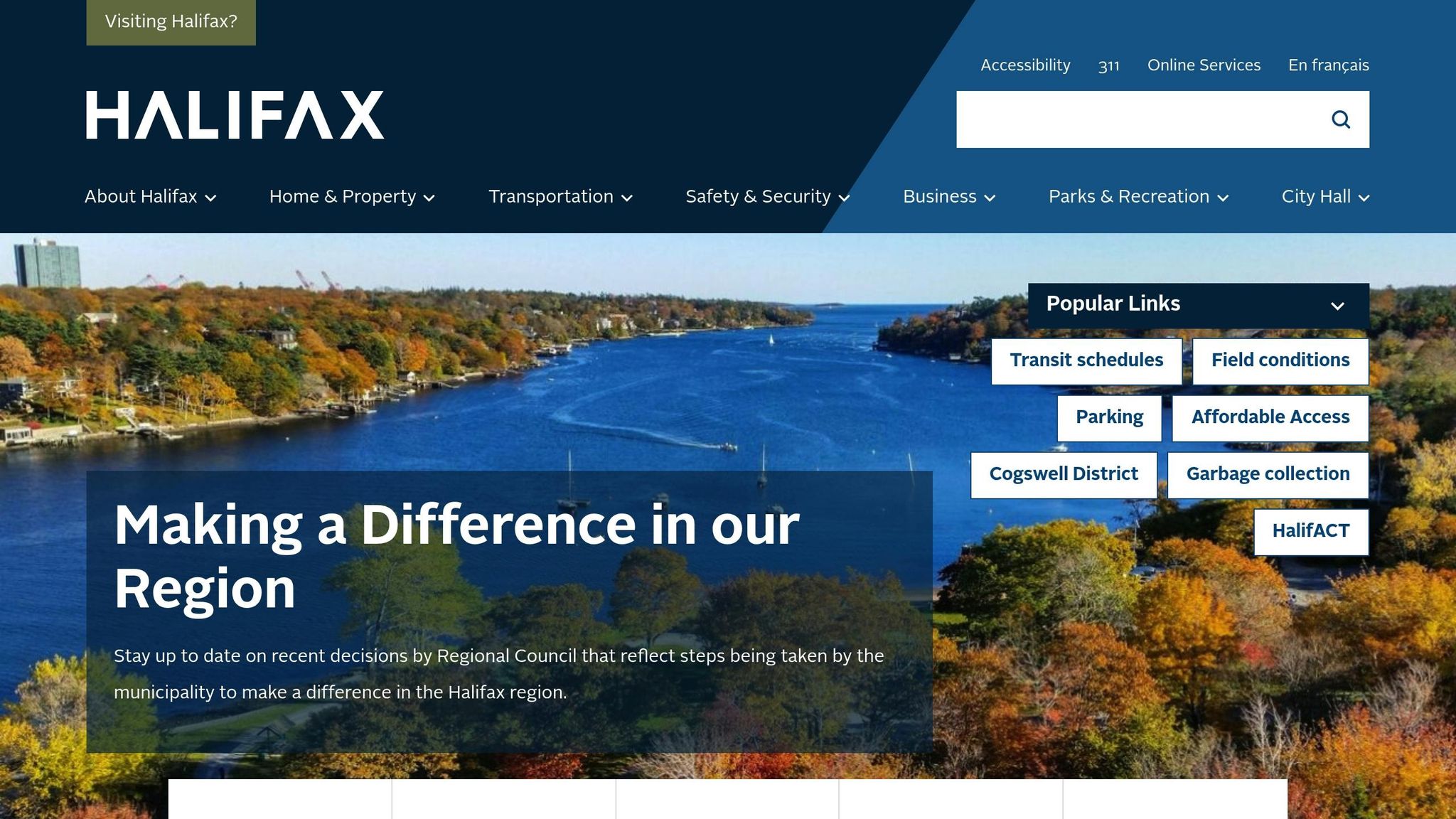Short-term rental (STR) rules vary significantly within a two-hour radius of Halifax, Nova Scotia. Each municipality has its own regulations, affecting licensing, zoning, occupancy limits, and enforcement. Here's a quick breakdown of the key differences by region:
- Halifax Regional Municipality (HRM): Clear licensing requirements, stricter rules for non-primary residences, and strong enforcement mechanisms. Urban areas like downtown Halifax offer more flexibility than suburban zones.
- Lunenburg County: Focuses on preserving heritage, with stricter rules in historic districts. Rural areas have fewer restrictions but still require compliance with local by-laws.
- Kings County (Wolfville, Kentville): Annual provincial registration is mandatory. Fees vary based on property type, and zoning rules differ across communities.
- Colchester County (Truro): Affordable entry point with simpler rules, but demand is lower compared to urban areas.
- Hants County: Divided into East and West Hants, with a mix of provincial and local regulations. Proximity to Halifax makes it attractive, though rural properties face infrastructure challenges.
- Annapolis Valley: Seasonal tourism drives demand, but compliance with provincial rules and rural infrastructure can be challenging.
- Eastern Shore: Coastal charm attracts summer visitors, but unclear regulations require direct consultation with municipal offices.
Each area has unique rules and opportunities. Understanding these differences is essential for STR operators to remain compliant and optimize their investments.
1. Halifax Regional Municipality

The Halifax Regional Municipality (HRM) stands as the largest jurisdiction for short-term rentals (STRs) in the region. Its regulations impact properties across key urban hubs like Halifax, Dartmouth, Bedford, and nearby areas. The municipality's goal is to strike a balance between encouraging tourism and preserving the character of its neighbourhoods. These rules form the foundation for managing STRs in urban settings.
Registration and Licence Requirements
To operate an STR, hosts must obtain a business licence. This involves providing detailed property information, proof of insurance, documentation of ownership or landlord consent, and evidence of essential safety measures like working smoke and carbon monoxide detectors and accessible emergency exits. The HRM distinguishes between STRs in primary residences and those in non-primary residences, with different rules for each. Insurance that specifically covers short-term rental activities is mandatory. Once all required materials are submitted, the application goes through a review process before approval.
Zoning and Occupancy Rules
STRs are allowed in residential zones if they’re part of a primary residence, but dedicated rental properties face stricter limitations. Urban areas, like the downtown peninsula, tend to offer more flexibility compared to suburban neighbourhoods. Occupancy limits are enforced based on factors like the number of bedrooms and available space, and hosts must ensure sufficient parking for guests. Additionally, noise bylaws and quiet hours are in place to uphold community standards, and operators are responsible for clearly communicating these rules to their guests. This zoning structure highlights the challenges of operating STRs across diverse communities.
Compliance and Enforcement Mechanisms
The HRM relies on a complaint-based system combined with periodic audits to ensure compliance. Hosts who fail to meet the requirements may face penalties, including fines or the suspension of their licence, if violations are not addressed promptly.
Investment and Operational Considerations
Central locations in Halifax tend to see the highest demand, particularly during peak seasons. However, hosts must account for factors like seasonal fluctuations, insurance costs, and property management expenses when evaluating profitability. Keeping up with the municipality’s evolving policies is also crucial for long-term success.
2. Lunenburg and Lunenburg County
Lunenburg County, unlike the urban-focused HRM, places a strong emphasis on preserving its heritage while also supporting tourism. The Town of Lunenburg and the surrounding county have regulations designed to protect the region's historic charm while fostering a thriving tourism economy. With its UNESCO World Heritage designation, the area is dedicated to balancing the preservation of its cultural assets with economic growth.
Registration and Licensing Requirements
If you're operating in the Town of Lunenburg, you'll need a business licence to get started. As part of the application, you'll typically need to provide proof of property ownership, liability insurance, and detailed documentation showing compliance with heritage guidelines. For properties located in designated heritage areas, there's an additional layer of scrutiny to ensure historical features are preserved, which can sometimes lead to longer processing times.
Zoning and Occupancy Rules
Zoning rules across Lunenburg County vary depending on the area. In the historic Old Town Heritage District, short-term rentals are allowed but must meet specific conditions aimed at maintaining the district's unique character. These include occupancy limits and other operational restrictions. Meanwhile, rural areas - such as waterfront cottages or country homes - enjoy more relaxed rules, with requirements tailored to local infrastructure and environmental factors. Local authorities enforce these regulations through inspections and community oversight.
Compliance and Enforcement Mechanisms
To ensure operators follow the rules, local authorities rely on regular inspections and a complaint-driven monitoring system that actively involves community feedback. Properties in heritage-designated zones receive periodic reviews by heritage officers, and a public registry is maintained for all licensed short-term rentals. If violations occur - especially those affecting heritage features - penalties like fines or licence suspensions can be imposed.
Investment and Operational Considerations
Lunenburg's strong tourism industry brings seasonal fluctuations that impact short-term rental performance. Warmer months see a surge in demand, allowing heritage-listed properties to charge premium rates, though they often come with higher maintenance and compliance costs. On the other hand, rural properties appeal to visitors seeking a classic Maritime experience, offering a different but equally rewarding opportunity for operators.
3. Kings County (Wolfville, Kentville, Berwick Area)
Kings County, which includes the Town of Wolfville, Kentville, and Berwick, has specific rules in place for short-term rental (STR) operators. To run an STR here, operators must register annually with Nova Scotia's Tourist Accommodations Registry and ensure their properties align with local municipal land-use by-laws. These steps aim to balance STR operations with the region's needs, setting it apart from more urban or heritage-focused areas.
Registration and Licensing Requirements
If you're running a short-term rental in Kings County, annual registration with Nova Scotia's Tourist Accommodations Registry is mandatory. Hosts must prove their properties comply with local land-use by-laws. Fees depend on the type of host: primary residence hosts pay $50 annually, while commercial and platform operators pay $500 per unit. Every listing must display a valid host registration number to remain compliant [2].
Zoning and Occupancy Rules
Properties must meet the zoning and land-use regulations specific to their location. These rules might limit occupancy, parking availability, or operating hours, so it's essential to understand the requirements for each community in Kings County.
Compliance and Enforcement Mechanisms
To stay within the law, operators must include their provincial registration number in all online advertisements. Listings that fail to meet these requirements must be corrected or removed. Non-compliance can lead to hefty fines ranging from $1,000 to $100,000 per day [2].
"A person who commits an offence under the Act or these regulations is liable on summary conviction to a fine of not less than $1000 and not more than $100 000." [2]
"An offence described in subsection [1] that is committed or continued for more than 1 day is considered to be a separate violation for each day it is committed or continued and the person who committed the offence is liable on summary conviction to a fine for each day the offence is committed or continued, up to a total of $100 000 annually." [2]
The Minister has the authority to deny, cancel, revoke, or suspend registrations if operators fail to meet the regulations or if such actions are deemed necessary for public interest. Additionally, registration details may be shared with municipal units to assist with local enforcement efforts.
4. Colchester County and Town of Truro

Colchester County and the Town of Truro, like other areas near Halifax, follow Nova Scotia’s provincial short-term rental (STR) standards but also have additional local rules that reflect their specific market needs. Truro, known as a central hub in Nova Scotia, draws visitors for both business and leisure, making it an attractive spot for STR operators. Below, we’ll break down the key aspects of registration, zoning, enforcement, and operational requirements in this region.
Registration and Licensing Requirements
If you’re operating an STR here, annual registration through Nova Scotia's Tourist Accommodations Registry is mandatory. Fees depend on the type of residence, and you’ll need to show proof that your property complies with local by-laws and zoning rules. Additionally, every STR listing must display its valid host registration number in any online advertisement. This ensures that safety and compliance measures are clearly met.
Zoning and Occupancy Rules
Zoning regulations differ between town and rural areas. In town, there are stricter rules regarding occupancy limits, parking, and operating hours. On the other hand, rural properties tend to have more flexibility. It's crucial to confirm your zoning designation and any associated restrictions before starting your STR.
Compliance and Enforcement Mechanisms
Local authorities take compliance seriously. They can deny, cancel, revoke, or suspend STR registrations if operators fail to meet provincial or municipal standards. To streamline enforcement, registration details are shared with municipal authorities, ensuring coordinated oversight across the region.
Investment and Operational Considerations
Truro’s central location makes it a prime spot for STR investments, especially with its local attractions driving steady visitor interest. Seasonal demand is often tied to outdoor activities and events, so it’s wise to plan for fluctuations. Properties should also be equipped to handle Nova Scotia’s unpredictable weather, with reliable heating systems and strategies to remain accessible during harsher seasons.
5. Hants County (East Hants, West Hants)
Hants County is divided into two municipalities - East Hants and West Hants - both of which follow Nova Scotia's provincial short-term rental framework while also enforcing their own local rules. If you're considering operating in this area, it's essential to stay updated on municipal licensing, zoning, and safety regulations. Each municipality brings its own set of challenges and opportunities.
Registration and Licensing Requirements
To operate a short-term rental in East Hants or West Hants, property owners must register with the provincial registry. Beyond provincial requirements, it's crucial to ensure your property aligns with local zoning by-laws and building codes. These additional steps help ensure compliance with both provincial and municipal standards.
Zoning and Occupancy Rules
Zoning and occupancy regulations vary depending on where your property is located within Hants County. Residential zones often come with specific rules, such as limits on occupancy and parking. For properties in rural areas, there may be different considerations and requirements. Be sure to consult local by-laws to understand how these rules apply to your property.
Compliance and Enforcement Mechanisms
Both municipalities adhere to provincial compliance measures for short-term rentals. Local authorities can inspect properties and enforce regulations, particularly if safety or zoning standards are not met. Keeping an eye on regulatory updates is key to avoiding potential issues.
Investment and Operational Considerations
Hants County's strategic location between Halifax and other major areas makes it an attractive spot for short-term rental investments. Factors like access to transportation and nearby attractions can play a big role in determining rental performance. However, rural properties may come with unique challenges, such as infrastructure and maintenance needs, which should be factored into your plans.
sbb-itb-b5e1074
6. Annapolis Valley Communities (Bridgetown, Middleton, Annapolis Royal)
In the Annapolis Valley, communities like Bridgetown, Middleton, and Annapolis Royal follow Nova Scotia’s provincial framework for short-term rental (STR) oversight. The Short-term Rentals Compliance Approach involves a collaborative system where provincial authorities, platform operators, and local municipalities work together to identify and address non-compliance. If a property is found to be in violation, a Notice of Offence may be issued. Operators also have access to an appeals process, and there are clear channels for the public to report concerns.
Although these enforcement practices align with those in nearby regions, they come with distinct challenges and opportunities for local STR operators, given the unique characteristics of these communities.
7. Eastern Shore Communities (Musquodoboit Harbour to Sheet Harbour)
The Eastern Shore, stretching from Musquodoboit Harbour to Sheet Harbour, is just a two-hour drive from Halifax. While this region holds potential for investment, zoning and occupancy rules aren't readily available online. To stay on the right side of regulations, it's best to check with municipal and provincial offices for the most up-to-date guidelines. This lack of clarity can influence how investors approach opportunities in the area.
Investment and Operational Considerations
The Eastern Shore's rural and coastal charm plays a big role in shaping rental prospects. Its proximity to Halifax makes it a popular destination for weekend getaways and longer vacations, especially during the summer months. However, demand tends to drop in the winter, so it's essential to plan for these seasonal variations. To ensure compliance, reach out to local municipal offices to confirm rental requirements and any specific regulations that might apply.
Benefits and Drawbacks
Building on earlier municipal overviews, here's a closer look at the unique trade-offs each region offers. Understanding these advantages and challenges can help guide investment decisions and operational strategies.
Halifax Regional Municipality stands out with its clear licensing rules and detailed guidelines, which make compliance straightforward. However, property owners must navigate higher costs and stricter enforcement measures.
Lunenburg and Lunenburg County balance heritage charm with restrictions. While the area's historic appeal can drive higher peak-season rates, these same heritage rules limit property modifications. Seasonal demand fluctuations also mean income can vary, requiring careful financial planning.
In Kings County, communities like Wolfville benefit from steady demand driven by a university presence and wine tourism. This helps maintain consistent occupancy throughout the year, but differing municipal interpretations of guidelines can create confusion.
Colchester County and the Town of Truro offer a more accessible entry point for short-term rental (STR) investors, thanks to lower costs and simpler regulations. However, these areas typically see lower rates and reduced demand compared to larger markets.
| Municipality | Key Benefits | Main Challenges |
|---|---|---|
| Halifax Regional Municipality | Clear regulations, strong demand | Higher compliance costs, stricter enforcement |
| Lunenburg and Lunenburg County | Heritage appeal, premium rates | Seasonal income variability, modification limits |
| Kings County | University and tourism-driven demand | Inconsistent guidelines, competition from hotels |
| Colchester County / Truro | Affordable entry, simple regulations | Lower rates, less demand |
| Hants County | Close to Halifax, less competition | Limited transit, seasonal demand |
| Annapolis Valley | Scenic and agricultural tourism | Seasonal operations, rural infrastructure |
| Eastern Shore | Coastal appeal, weekend getaways | Regulatory uncertainty, seasonal demand |
Hants County benefits from its proximity to Halifax and relatively low property costs. However, limited transit options mean operators may need to invest more in targeted marketing to attract guests.
Annapolis Valley communities thrive on agricultural tourism and scenic views, particularly during harvest seasons. However, operators must plan for significant seasonal variations, with winters requiring creative strategies to maintain bookings.
Eastern Shore communities face uncertainty around regulations, requiring property owners to stay updated on evolving local policies. While the area's coastal charm draws summer visitors, winter demand tends to drop off significantly.
Seasonal demand remains a key challenge across most regions. Some property owners focus exclusively on peak-season rentals, while others explore mid-term rental options or accept lower occupancy rates during the off-season.
Compliance requirements also vary widely. Halifax offers a well-established system with clear rules, but it comes with more administrative work. In smaller communities, property owners may need to directly engage with municipal offices to clarify local regulations.
For those considering multiple locations within a two-hour radius of Halifax, balancing market potential against regulatory complexity is crucial. Areas with stricter rules often see stronger demand and higher rates, while more flexible jurisdictions might require more active marketing efforts to achieve profitability.
These insights highlight the importance of tailoring strategies to the specific conditions of each location.
Conclusion
Short-term rental (STR) regulations differ significantly within a two-hour radius of Halifax, with notable variations across Halifax, Lunenburg, Kings County, and surrounding areas. Regions like the Eastern Shore and parts of Hants County stand out for their more lenient rules, making it easier for property owners to enter the market with fewer formalities.
To succeed in Nova Scotia’s dynamic STR market, it’s crucial to align your investment plans with the specific regulations of your chosen area. Areas with fewer restrictions provide greater flexibility, allowing you to adapt rental strategies as market conditions shift. Understanding and tailoring your approach to local requirements can make all the difference in achieving your goals.
FAQs
What are the key differences in short-term rental rules between urban and rural areas near Halifax?
Short-term rental (STR) regulations can differ quite a bit depending on whether you're in an urban area or a rural community within a two-hour drive of Halifax. In cities like Halifax itself, property owners usually need to register their rentals with the municipality. Zoning rules here are more accommodating, often allowing STRs in both residential and commercial zones, giving owners more leeway to operate.
Rural areas, on the other hand, tend to impose tighter restrictions. Typically, STRs are limited to just one dwelling per lot, and many municipalities only allow rentals in primary residences. These rules are designed to strike a balance between welcoming visitors and preserving the character of local communities, as well as ensuring housing remains available for residents.
For property owners and investors, knowing these distinctions is crucial to staying compliant and shaping a rental strategy that works within the rules.
What are the short-term rental rules in Lunenburg County, especially for heritage properties?
In Lunenburg County, operating a short-term rental (STR) requires registration and adherence to local land use regulations. This process involves securing a Development Permit and a Zoning Confirmation Letter, which comes with a fee of $60.90. If the property is designated as heritage, owners must also complete a Heritage Development Encroachment Application to ensure the rental respects preservation guidelines.
The municipality enforces compliance through permits, inspections, and strict heritage conservation rules. Property owners who fail to follow these requirements risk fines or even losing their rental permits.
What factors should short-term rental operators consider when investing in areas with seasonal tourism, like the Annapolis Valley?
When running short-term rentals in areas with seasonal tourism, like the Annapolis Valley, it’s crucial to account for the ups and downs in occupancy and revenue during off-peak periods. By studying local tourism trends and adjusting pricing to align with periods of high and low demand, operators can better manage their income throughout the year.
It’s also important to stay on top of zoning laws, licensing rules, and any regional restrictions that might affect your rental business. To attract more guests during the quieter shoulder seasons, consider investing in marketing efforts and offering unique experiences that set your property apart. Careful planning, attention to local regulations, and creative strategies can go a long way in ensuring long-term success.
Related Blog Posts
- Short term rental regulation in HRM ( Halifax, Bedford, Dartmouth )
- Short-Term Rental Regulations in Nova Scotia: Eastern Shore (Sheet Harbour, Guysborough, Sherbrooke)
- Short-Term Rental Regulations in Nova Scotia: Yarmouth & Acadian Shores (Yarmouth, Clare, Digby)
- Short‑Term vs Vacation Rental: What Does “28 Days or Less” Really Mean?



